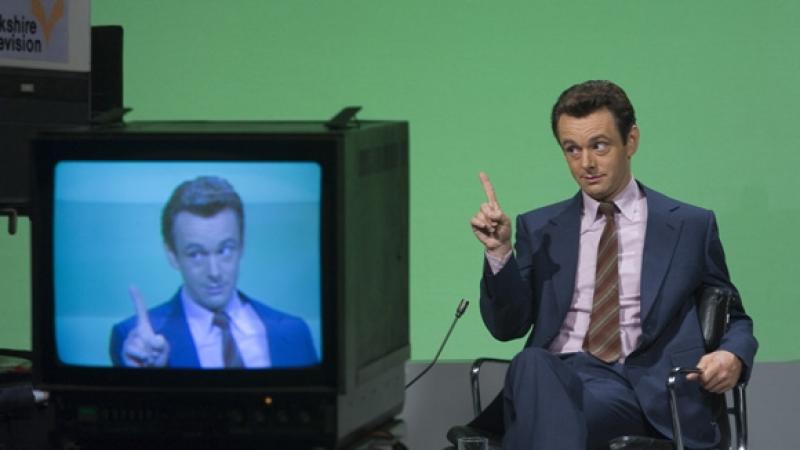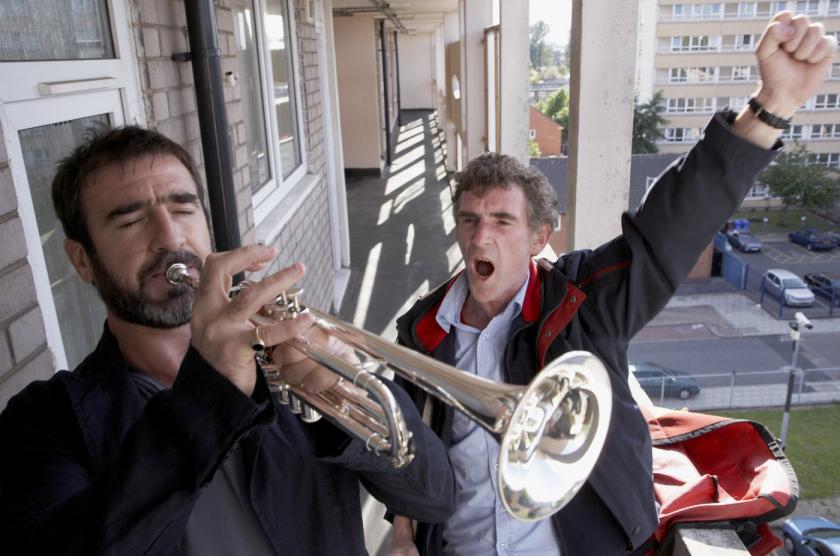Football and film: what is that? Let’s agree that it has not always been the happiest relationship. If you’ve observed Brian Clough’s brief encounter with the Leeds squad in The Damned United, you'll get the picture. They really ought to be best mates, both being forms of mass entertainment. They have the same values, dreams and indeed time frame: 90 minutes or thereabouts (depends who's reffing/directing). And at their most venal they both pray at the altar of profit. Somehow, though, they just don’t click.
Why? Time for a bit of punditry, Ron. The main problem is no scriptwriter can make up stories to match football’s improbable narratives, its career-crushing lows and redemptive triumphs. The Damned United is a very very rare example of a tolerable film about real footballing events simply because Brian Clough was all but a figment of his own imagination. Football people are generally less complex. (Pictured below, Michael Sheen as Clough.)
 Another reason to ponder: it’s axiomatic that actors are as bad at football as footballers are at acting. Ian McShane in Yesterday’s Hero and Sean Bean in When Saturday Comes simply couldn’t cut it on the pitch. And as for traffic in the other direction, players are not good at pretending. When footballers feign injury on the pitch, spectators can see right through the performance from row Z. This talentlessness has been showcased, infamously, in Escape to Victory, starring Pele, Bobby Moore and, er, Ipswich Town's John Wark.
Another reason to ponder: it’s axiomatic that actors are as bad at football as footballers are at acting. Ian McShane in Yesterday’s Hero and Sean Bean in When Saturday Comes simply couldn’t cut it on the pitch. And as for traffic in the other direction, players are not good at pretending. When footballers feign injury on the pitch, spectators can see right through the performance from row Z. This talentlessness has been showcased, infamously, in Escape to Victory, starring Pele, Bobby Moore and, er, Ipswich Town's John Wark.
What you can say about football is that it does produce characters. A few years ago directors latched onto that when two of the most iconic footballers of the 1990s were offered proper roles in proper films. In Lock, Stock and Two Smoking Barrels, the midfield hard man and former hod-carrier Vinny Jones was cast as a small-time debt collector in a long black leather coat. The film had the narrative values of a cartoon strip, and Jones fitted seamlessly into Guy Ritchie's world of simplistic psychology. In essence he played exactly the same character in the film as he embodied on the pitch, an enforcer who operates on the wrong side of the law. He has been repeating the same performance off and on ever since.
In Looking for Eric, Ken Loach had the brilliant idea of riffing on Eric Cantona’s enigmatic allure by casting him as himself, a sort of fantasy life-coach who uses gnomic and often plain inaudible gallicisms to guide a postman with the same (first) name through a sea of troubles. Cantona had the wit to allow himself to be sent up. "I am not a man," he says in the film's most memorable line, puffing out his cockerel torso. "I am Cantona."
And then Zinedine Zidane had his own movie moment in Zidane: A 21st Century Portrait, the Scottish conceptual artist Douglas Gordon paid hommage by capturing his every feint and flick through 90 minutes in a Real Madrid shirt. Perhaps the most intensely compelling of all football films, it is a documentary that aspires to the condition of drama through sheer force of personality. And it argues that when they take to the pitch, the greatest footballers are not only playing, but playing themselves. So who needs actors to come in and do a job?
Watch a clip from Zidane: A 21st Century Portrait















Add comment